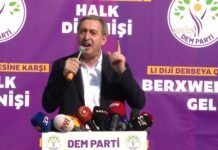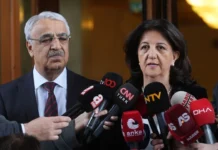Human rights defender and physician Dr. Serdar Küni has been sentenced to four years, two months in prison on charges of aiding a terrorist organization by treating alleged members of the outlawed Kurdistan Workers’ Party (PKK) during clashes between the PKK and Turkish security forces in Şırnak’s Cizre district, the Bianet news website reported.
Küni, a doctor working as a consultant at the Human Rights Foundation of Turkey’s (TİHV) Cizre Referral Center, was accused of treating patients seeking medical assistance at the medical center after hours. He was retried after the Gaziantep Regional Court of Appeals reversed the verdict of a local court.
In a statement the TİHV said the ruling was based on groundless allegations and the statements of witnesses who subsequently recanted their testimony, claiming they were forced to sign them under duress.
The PKK is an armed secessionist group listed as a terrorist organization by Turkey, the European Union and the United States. The group has been waging an insurgency against the Turkish state since 1984. Violence in the largely Kurdish Southeast has escalated since the collapse of a peace process in July 2015.
With the breakdown of the process, the PKK’s urban youth wing groups – originally known as the Patriotic Revolutionary Youth Movement (YDGH) and since December as the Civil Protection Units (YPS) – recruited local young people, including children, and tightened their grip on the neighborhoods of some towns in the Southeast by planting explosive devices at the entrances to neighborhoods and organizing guard duty at barricades. The PKK ensured that guns, ammunition, rockets and improvised explosive devices were stockpiled, according to government reports.
In response to the sealing off of neighborhoods by the PKK, the Turkish government authorized police and military operations that involved the use of armored personnel carriers and, increasingly, heavy artillery. These operations were conducted under extended strict curfews.
Cizre, a town of 132,000 near the banks of the Tigris River and the borders of Syria and Iraq, was the worst hit in terms of the scale of fighting and the casualty toll. The deaths occurred during a 78-day curfew imposed on the town between December 14, 2015 and March 2, 2016.
According to a report by The Guardian, more than 600 Kurdish rebels were killed in Cizre. Human rights groups say 92 civilians were killed in the town during the military operation, and another 171 bodies have been found since hostilities ended.
















